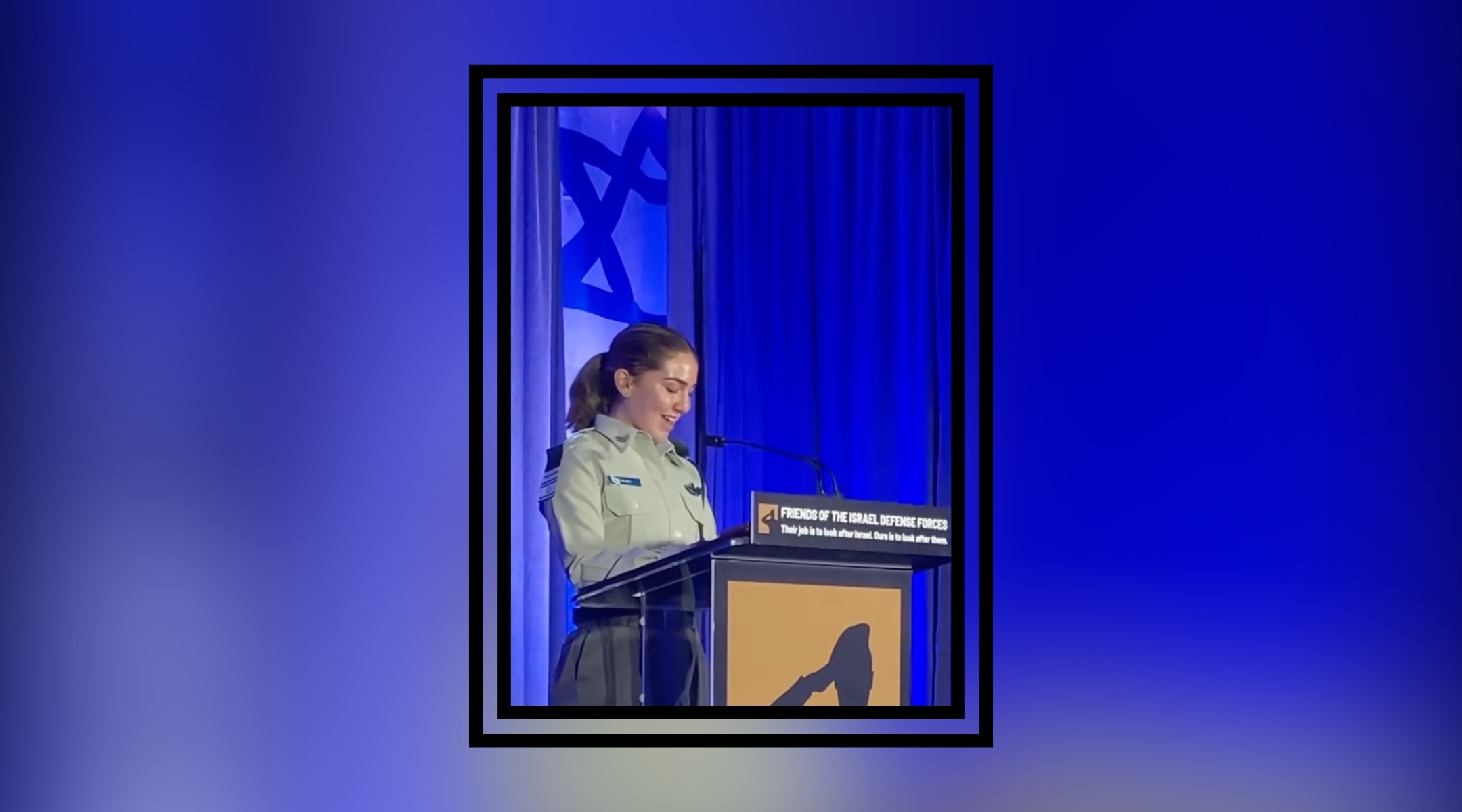Father of lone soldier killed in Jerusalem stabbing attack running for Georgia state Senate
David Lubin was inspired to run against a Democratic incumbent who abstained from voting for an antisemitism bill

David Lubin is running for state Senate in Georgia. His daughter Rose, who was killed in a terror attack in Jerusalem in 2023, is visible in the family photo on his campaign website. Courtesy of David Lubin
(JTA) — The Atlanta-area father of an Israeli soldier who was killed in a stabbing attack in Jerusalem in November is running for Georgia state senate after the Democratic incumbent in his district did not back a bill aimed at combating antisemitism.
David Lubin, a general contractor, told the Atlanta Journal-Constitution he is challenging Sen. Sally Harrell in the Democratic Party’s May primary because of her stance on H.B. 30, which made the International Holocaust Remembrance Alliance’s working definition of antisemitism the official one in use by the state.
After criticizing it on the statehouse floor, Harrell abstained from voting on the bill, which passed in the Senate on Jan. 25 and was signed into law the following week.
“To walk off and just walk out of the room, but also not to come and talk to the Jewish community who is the most heavily invested group in this? What is she doing with other communities?” Lubin told the Jewish Telegraphic Agency. “What is she doing with other minorities? What is she doing just in general, if she’s this far disconnected with her constituents?”
Lubin became involved in lobbying lawmakers to pass H.B. 30 after his 20-year-old daughter, Rose Lubin, was stabbed to death in a terror attack in Jerusalem, as violence escalated amid Israel’s war with Hamas in Gaza. Rose had moved to Israel and joined the army as a “lone soldier” after graduating from high school in Georgia.
“Rose’s life was really centered around not allowing things like this to occur and not stepping up,” Lubin said. “And that’s really what motivates my life now. When something like this occurs, I know that I have to [step up]. I’m obligated to.”
In December, Harrell sponsored a bill honoring Rose Lubin’s memory. The daughter of Harrell’s chief of staff was acquainted with Rose and made the connection, David Lubin told JTA.

Rose Lubin, 20, an Israeli-American lone soldier serving in the Border Police, was stabbed by a terrorist in Jerusalem and died of her wounds a few hours later on Nov. 6. (Screenshot via Facebook. Design by Jackie Hajdenberg)
In the process of working on that bill, Lubin said he and Harrell discussed H.B. 30.
“Never once did she express to me that she had any concerns, any doubts, any confusion, any misunderstanding,” he said.
The following month, Harrell, a progressive Democrat whose district includes a heavily Jewish neighborhood in Dunwoody, announced on the day of the vote that she felt uncomfortable supporting the bill because no anti-discriminatory measures for other marginalized groups were being brought to the legislature.
“If we had two bills today — if we had this bill, H.B. 30, that defines antisemitism, and we also had a bill that defines Islamophobia, I would feel so much more at peace,” Harrell said.
“Definitely, we should have what the senator referred to as a roadmap for Islamophobia,” she added. “We should have definitions for people in the LGBT community, we should have definitions for our Indigenous people.”
Critics of the IHRA definition of antisemitism say its approach to anti-Zionist speech can limit free speech. The local chapter of Jewish Voice for Peace, an anti-Zionist group, opposed the bill.
In her remarks, Harrell referenced both Rose Lubin and antisemitic flyers that had been distributed around Atlanta suburbs. (The white supremacist group Goyim Defense League, which is based in Florida but has members across the United States, is often responsible for such pamphlets.)
“This partial action that we’re taking isn’t going to eliminate hate, which I think all of us in this chamber — that’s what we want,” she said. “We will not eliminate hate until we learn to listen to one another.”
Lubin told JTA he feels that Harrell brought up his daughter’s story in her floor remarks to disparage the antisemitism bill.
“She explained to me that Rose and the bill were never connected, that they were two separate things,” Lubin said. “When I walked away from meeting with her, I realized that she was disconnected from her constituents, that she just didn’t understand the people in her community.”
David Lubin is running for state Senate in Georgia. His daughter Rose, who was killed in a terror attack in Jerusalem in 2023, is visible in the family photo on his campaign website. (Screenshot)
Jewish leaders in the state said that they, too, were confused by Harrell’s stand, which she stood out in the state Senate for making. She was the only senator to abstain from the vote, while six voted against the bill and 44 endorsed it.
“I’m terribly disappointed in the senator. I don’t understand what point she’s making,” Dov Wilker, regional director of American Jewish Committee Atlanta, told the local news organization Rough Draft Atlanta. He said he had met with Harrell but failed to convince her to support H.B. 30.
Lubin is running in Georgia’s May 21 primary as a moderate Democrat, in an effort to stem what he sees as a tide of anti-Israel sentiment among progressives.
“You can kind of connect it with the progressive movement and the Democratic Party. It is growing there. And then there’s moderate Democrats like me who go, ‘Wait, I don’t fit into that box,’” he told Jewish Insider. “Before we turn around, we’re going to see our state legislatures that are filled with people that are against Israel, and they can change the dynamics of this country for us very quickly.”
Some of the other issues on his platform include reproductive rights, gun safety and Medicaid expansion.
But he also said he is running because of Rose, the oldest of his five children. At her funeral in Jerusalem, attended by thousands, her commander, friends and brother extolled her as tough but also quirky, a cheerleader and a wrestler at her Atlanta high school, a gifted student who carried out her lifelong dream of making aliyah just as soon as she could.
“The people that I talked to said, ‘David, if anyone can stand up to this, it’s going to be you, with your current situation, who you are, what you stand for, what you represent, who has a chance.’ We talked about that as a family,” Lubin said about his bid for state Senate. “My daughter, she lived that way every day. And it inspired me.”
This article originally appeared on JTA.org.
A message from our Publisher & CEO Rachel Fishman Feddersen

I hope you appreciated this article. Before you go, I’d like to ask you to please support the Forward’s award-winning, nonprofit journalism so that we can be prepared for whatever news 2025 brings.
At a time when other newsrooms are closing or cutting back, the Forward has removed its paywall and invested additional resources to report on the ground from Israel and around the U.S. on the impact of the war, rising antisemitism and polarized discourse.
Readers like you make it all possible. Support our work by becoming a Forward Member and connect with our journalism and your community.
— Rachel Fishman Feddersen, Publisher and CEO
























